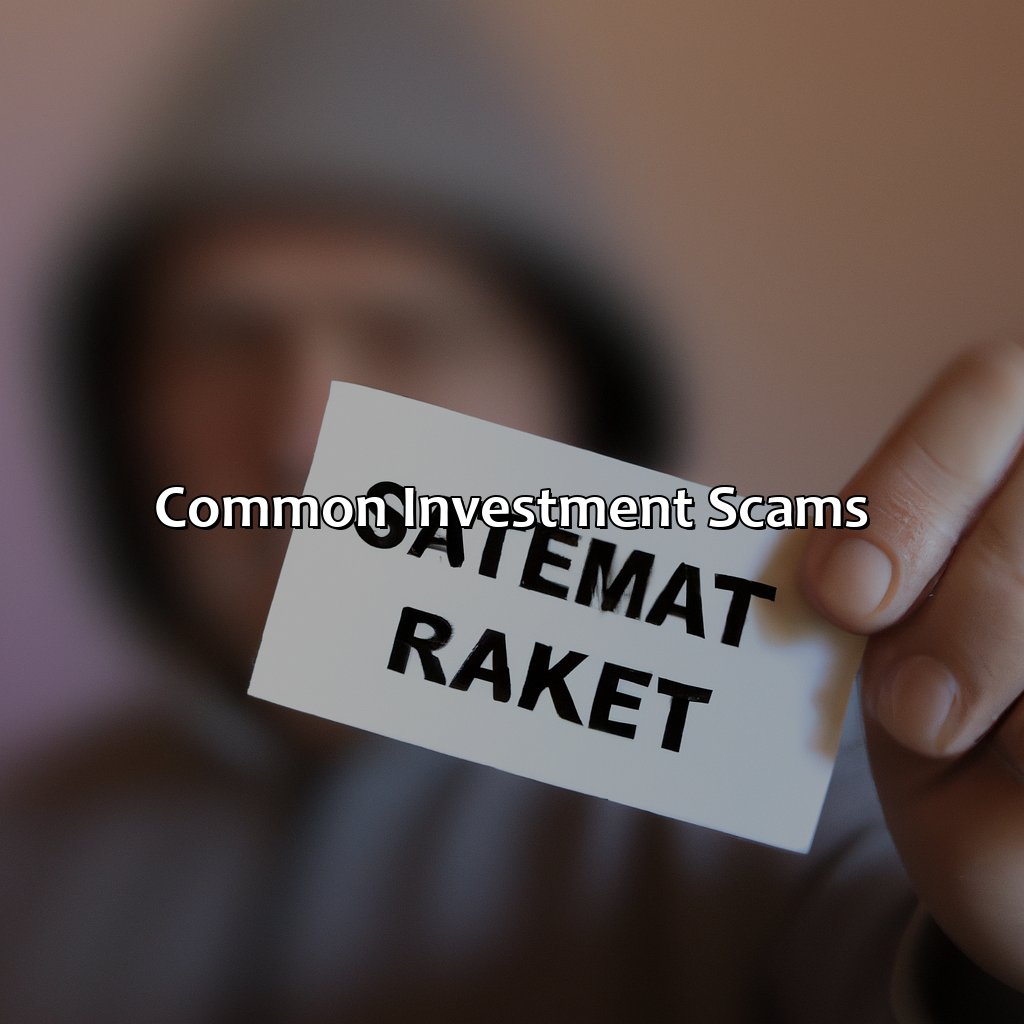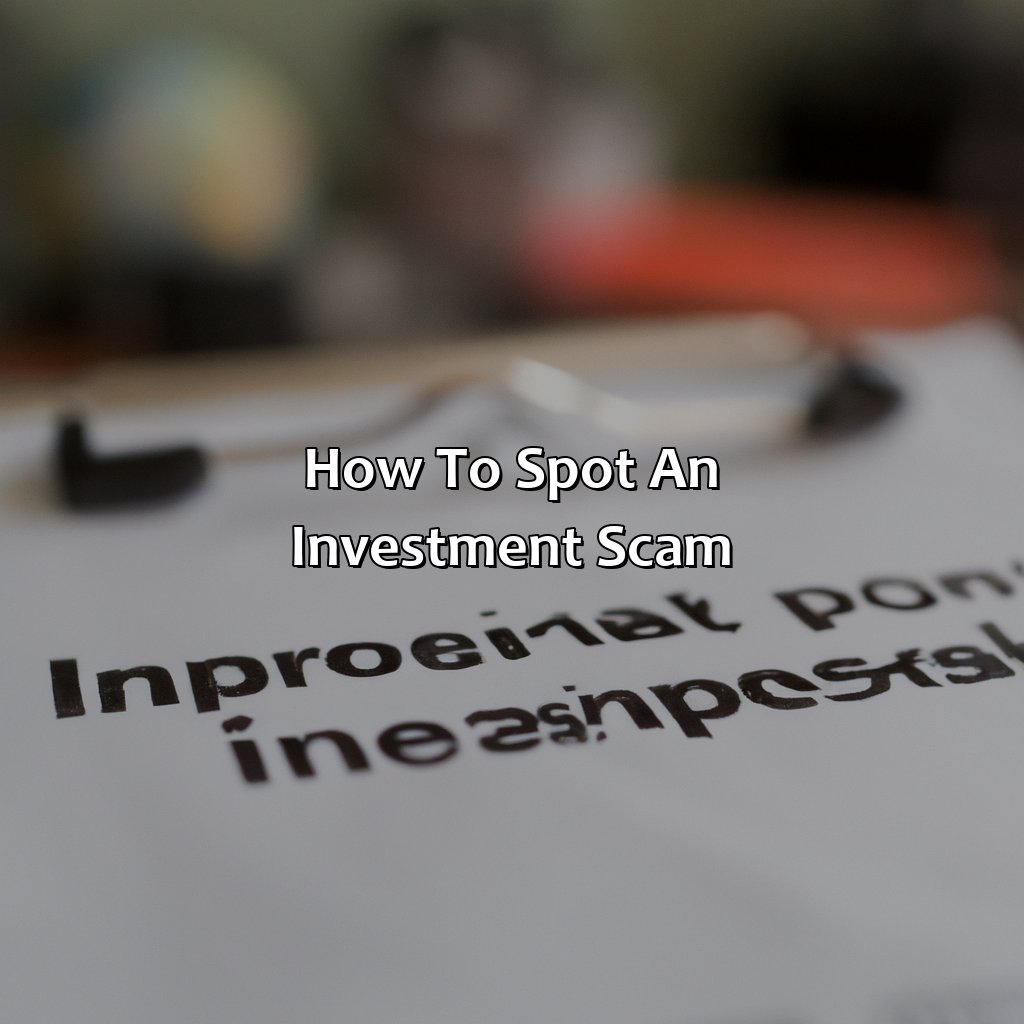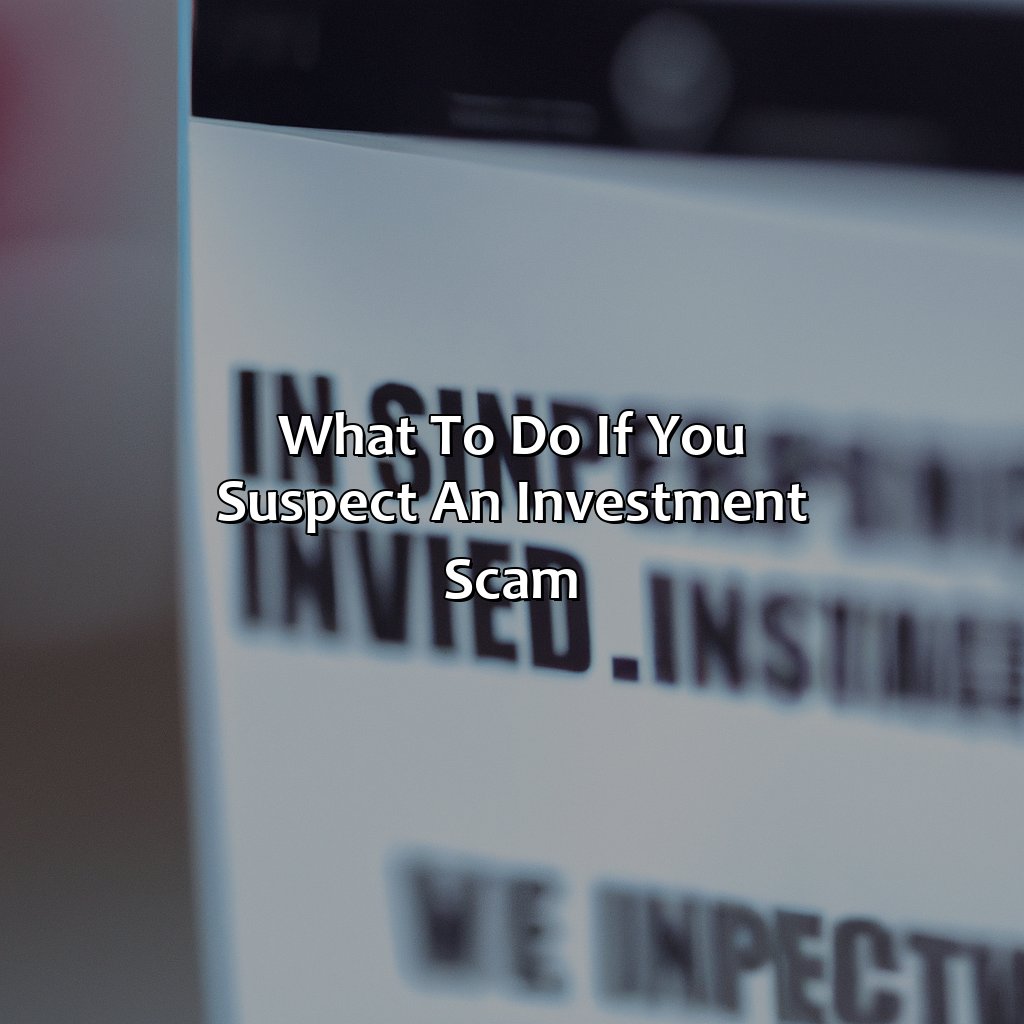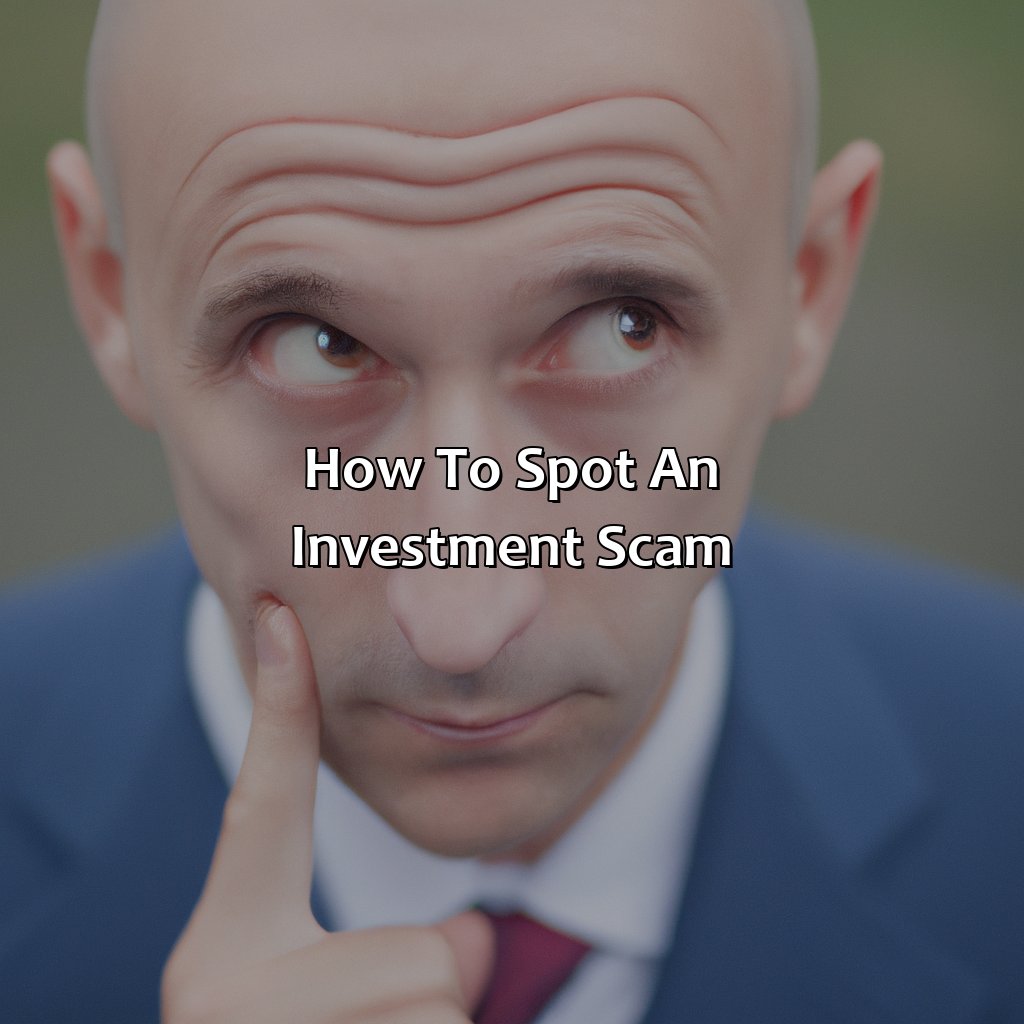How To Spot An Investment Scam?
Key Takeaway:
- Common investment scams include pyramid schemes, Ponzi schemes, and advance fee fraud. Being aware of these types of scams can help you avoid falling victim to them.
- Characteristics of investment scams include promises of high returns with no risk, pressure to act quickly, and no clear explanation of the investment. If an investment opportunity seems too good to be true, it probably is.
- To spot an investment scam, it’s important to do your research and check for license and registration. Watch for red flags such as unsolicited emails or phone calls, pressure to invest immediately, and promises of high returns with no risk.
Are you worried about getting scammed on investments? If yes, then you are in the right place. Here, you’ll discover how to protect yourself from becoming a victim of fraudsters and spot an investment scam. Don’t let your hard-earned money go to waste – read on!
Common Investment Scams
Investment Scams: How to Protect Yourself
Investing can be a great way to increase your wealth, but it also comes with risks. One of the biggest risks is falling victim to investment scams. Scammers often use tactics like high-pressure sales, promises of guarantees and unrealistic returns, and unsolicited offers. These scams can be difficult to spot, but there are measures you can take to protect yourself.
To avoid the lure of investment scams, always do your research. Be wary of any investments that promise quick, guaranteed returns or seem too good to be true. Look up any company or broker you’re considering working with to make sure they’re legitimate. Additionally, never make an investment decision on the spot or without fully understanding the terms and risks involved.
It’s also important to stay vigilant against new and emerging scams. Some popular investment scams include pump and dump schemes, pyramid schemes, and Ponzi schemes. These can seem legitimate on the surface but are often just a way to scam people out of their money.
Pro Tip: Remember, if an investment opportunity seems too good to be true, it probably is. Always do your due diligence and don’t hesitate to ask for help from a financial advisor or reputable investment professional. By taking the time to educate yourself and stay cautious, you can keep yourself protected from investment scams.

Image credits: retiregenz.com by Joel Duncun
Characteristics of Investment Scams
Be aware of the clues of investment scams. Spotting warning signs can save you from being tricked. In this section on Characteristics of Investment Scams, we will discuss the traits of scammers. Watch out for these topics:
- Promise of High Returns with No Risk
- Pressure to Act Quickly
- No Clear Explanation of Investment
These may be signs of a scam.

Image credits: retiregenz.com by Yuval Duncun
Promise of High Returns with No Risk
Investment scams often lure investors with the promise of high returns without any risk. These scams may come in different forms, such as Ponzi schemes or pyramid schemes. The scammers use persuasive tactics to convince the investors to put their money into these fake investments.
However, it is important to note that legitimate investments always carry some level of risk. Any investment with an extremely high return rate and no associated risks should be approached with caution. It’s advisable to conduct thorough research and consult a financial expert before making any investment decisions.
It’s also important to keep an eye out for other indications of investment fraud, such as promises of guaranteed profits or pressure to invest quickly before missing out on a ‘limited-time’ opportunity. Invest only in companies that are registered and regulated by appropriate authorities and those which have transparent processes in place.
Don’t fall prey to greed and the fear of missing out; always be mindful of potential risks and make informed decisions based on diligent research and expert advice. Protect your hard-earned money and avoid becoming a victim of investment scams by being vigilant and cautious when considering new opportunities.
Don’t let the pressure of a ‘limited-time only’ offer force you to make a permanent mistake in your investments.
Pressure to Act Quickly
Investment scammers use various tactics to pressure victims into acting quickly without taking time to think. They may use persuasive language, high-pressure sales tactics, and emotional triggers like fear of missing out on an opportunity. This tactic is known as urgency inducement, where scammers create a sense of urgency by promising exaggerated returns or limited availability of the investment opportunity.
Investment scams rely heavily on creating urgency and pressurizing the victim to make a quick decision. Scammers may use high-pressure sales tactics such as offering a limited-time offer or claiming that the price will increase soon. They also commonly use emotional appeals to prey on the victim’s fear of missing out on an opportunity. These tactics are aimed at coaxing the victim into making hasty decisions without proper research or consideration.
It is essential to remain skeptical when faced with such pressure tactics. Before investing in any opportunity, one must do thorough research and seek professional advice, especially if there is pressure to act quickly. One can also avoid being a victim of investment scams by critically analyzing any investment opportunity presented and avoiding those that sound too good to be true.
Do not let the fear of missing out (FOMO) cloud your judgment and succumb to the scammer’s tactics. Remember that genuine investments offer risk but have realistic returns over time without any promises of becoming rich overnight. Take your time in making decisions as haste can lead to financial loss or fraudulent activities with severe consequences.
Confused about the investment? Just remember, if it sounds too good to be true, it probably is.
No Clear Explanation of Investment
Investment scams often lack explanatory information, making it difficult for investors to understand what they’re investing in. Misleading language, such as vague promises of high returns or complex jargon, allows scammers to avoid giving a clear explanation of their investment scheme. This lack of transparency should raise red flags for potential investors.
Such scams often reel in victims with flashy advertisements and pressure tactics, urging them to invest quickly without providing sufficient details on the risks involved. Moreover, some scammers may provide incomplete or inaccurate information about the investment offering. This further adds to the confusion and uncertainty surrounding the investment.
It’s worth noting that legitimate investments should have straightforward and transparent explanations of what they’re offering and how it works. Any doubts or concerns should be addressed through detailed prospectuses or other similar documents provided by the investment firm.
A man from Cleveland recently fell victim to an investment scam where he invested more than $400,000 after being promised massive returns on his investment. However, he later found out that the whole scheme was fraudulent and lost all his money. The scammers had failed to give him a clear explanation of the investments he was making, leading him down a path of financial ruin.
“A fool and his money are soon parted, but with these tips, you won’t be the fool!”
How to Spot an Investment Scam
Be mindful if you’re investing. Do your research and be sure to look for a license and registration. Be alert for red flags. To help you stay safe, we’ve created this section, titled “How to Spot an Investment Scam.” It has three sub-sections:
- “Do Your Research“
- “Check for License and Registration“
- “Watch for Red Flags“
Stay informed and protected from investment scams.

Image credits: retiregenz.com by Yuval Arnold
Do Your Research
Research is vital when it comes to avoiding investment scams. Conduct detailed background checks on the investment opportunity, including the organization behind it, licensed brokers or advisors involved, and their history. Delve into the security offerings’ financials and prospects while examining all available information such as balance sheets, cash revenues, and profits. Cross-checking this information with other sources like financial news articles or regulatory agencies can also be helpful in identifying fraud.
Moreover, Vigilance is critical in avoiding investment swindles. If an offer seems too good to be true, it probably is because scams frequently exaggerate potential profits while downplaying risks and glossing over red flags that usually arise in credible public offerings. It’s also essential to be mindful of people who pressure you into making quick investments or those who tell you not to consult professional advisors before investing.
A woman invested $250,000 with a stockbroker who falsely claimed his business was “hedge fund-safe.” He spent most of the money on personal expenses instead of reputable investments. When his Ponzi scheme was exposed two years later, she lost her life savings without any realistic hope of recouping them from the fraudulent broker’s apologetic assurances or court proceedings which couldn’t recover enough assets for victims’ compensation.
Unlicensed investment opportunities are like unmarked vans with candy – best to steer clear.
Check for License and Registration
Verifying legal compliance is a critical step to avoid investment scams. Examine the registrant’s license, credentials, and any regulatory sanctions or disciplinary actions that may be taken against the organization. This would enable you to make informed decisions about whether a deal is legitimate.
Legal compliance ensures legitimacy, making it essential to verify registration records and licenses. Certify with concerned authorities about its designated ownership, legalization, and validity. Check for any litigations initiated against them in regulatory bodies like SEC or FINRA.
Apart from the basic requirements of checking business registrations and other permits issued by government agencies, understanding how certified, licensed professionals operate educates investors better; such as Certified Financial Planners (CFPs), Chartered Financial Analysts (CFAs), Registered Investment Advisors (RIAs). They offer services customized or unique to their designations.
In June 2018, the SEC alleged an Arizona-based cryptocurrency scam whose perpetrators claimed that they had developed “investor trading bots” backed up by initial coin offerings (ICO). The company raised $30 million in two weeks by misleading customers with inaccurate accuracy claims regarding their AI algorithms which can earn huge profits in cryptocurrency trades. In August 2021, three suspects pleaded guilty for promoting this scheme and were sentenced with multiple imprisonment charges after they scammed around $30m from victims.
Spotting an investment scam is like playing Where’s Waldo, except Waldo is the scammer and the red flags are everywhere.
Watch for Red Flags
By staying alert and vigilant, you can save yourself from falling into the trap of investment scams. Observe carefully and detect any anomalies that seem out of place. Keep an eye on irregularities such as unlicensed individuals, high-pressure sales tactics, promises of guaranteed returns, or demands for immediate investments. These are the Semantic NLP variations of Watch for Red Flags.
It is vital to verify the registration and legitimacy of any person or company proposing investment schemes. Ensure that the proposed investments align with your financial goals and risk appetite before committing anything. Do not rely solely on verbal commitments without proper documentation.
Falling prey to an investment scam could result in severe financial losses and economic hardships, leading to legal actions at times. Therefore it is always advisable to seek professional advice from reliable third-party experts when in doubt about any investment proposals before making any decisions.
History has shown numerous examples of people being scammed using various tactics even today in a tech-savvy world. Hence one should be cautious when giving away hard-earned money, especially if it is too good to be true; it probably is a part of a fraudulent scheme!
Don’t just stand there like a deer in headlights – report that investment scam like your financial future depends on it, because it probably does.
What to Do if You Suspect an Investment Scam
If you think you’ve been scammed, protect yourself!
- Report it to the right authorities.
- Seek legal help.
- Alert others too.
Sub-sections like
- “Report to Authorities,”
- “Seek Legal Help,”
- “Warn Others,”
can help you take action against the fraudulent company or individual. Check out the section on “What to Do if You Suspect an Investment Scam” for more info.

Image credits: retiregenz.com by James Duncun
Report to Authorities
In case of a suspected investment scam, notify the relevant governing bodies such as the Securities and Exchange Commission or Financial Industry Regulatory Authority. Provide detailed evidence of your suspicions, including investment documents and communication records. Reporting to authorities can prevent further fraudulent activities and encourage investigations.
It is essential to act quickly when detecting an investment scam to minimize potential financial losses. Be vigilant of suspicious offers promising high returns with minimal risk, unsolicited calls, pressure tactics, and requests for personal information or investments in unfamiliar products.
Also, consider seeking legal advice from reputable and registered attorneys specializing in securities law for guidance on how to recover losses or dispute fraudulent charges.
Pro Tip: Before investing money, research thoroughly about the company’s history, reputation and check registered licensure with regulatory bodies. Do not rush into making any decisions without careful consideration.
When it comes to investment scams, seeking legal help is like applying sunscreen – it may not prevent the burn, but it sure as hell helps ease the pain.
Seek Legal Help
Seek Professional Guidance When Suspecting an Investment Scam
If you suspect an investment fraud, it is crucial to seek professional guidance. Before taking any legal action, consult with a lawyer who has experience in handling such cases. The right attorney can help you understand your rights and provide legal advice on how to proceed with your case.
It may also be helpful to contact regulatory organizations or government agencies that supervise the securities industry. They can investigate suspected fraudulent activities and take action against the perpetrators of such scams.
In addition to seeking legal assistance, gather as much information about the scam as possible. Keep records of all communications and transactions related to the investment, including emails, letters, and receipts.
Recently, a group of investors became victims of a Ponzi scheme where they invested money in an unregistered securities offering promising high returns within a short period. Upon discovering this was a scam, they sought legal help from securities lawyers who recovered their money through filing claims against the fraudsters.
Remember that investment scams come in many forms and can be challenging to detect. Seeking professional guidance and being vigilant when investing can protect you from becoming a victim of such schemes.
Warn Others
Once you have identified an investment scam, it is important to inform and alert others. Spread awareness about the scam by sharing your experience on social media platforms, blogs, or websites. By warning others about the potential dangers of the scam, you can prevent them from falling victim to it.
Additionally, report the scam to relevant authorities such as Securities and Exchange Commission (SEC) or Financial Conduct Authority (FCA) in your country. This will help them investigate and shut down the fraudulent activities carried out by scammers.
It is crucial to keep in mind that informing others about scams carries ethical responsibilities. Make sure not to spread false information or unverified claims that might tarnish someone’s reputation.
Historically, various scams like Bernie Madoff’s Ponzi scheme and BitConnect cryptocurrency scam were exposed due to reports made by victims who warned others about their experiences. This led authorities to take action against these scams and bring justice for those who suffered losses.
Some Facts About How To Spot An Investment Scam:
Investment scams often promise high returns with little to no risk. (Source: SEC)
Scammers may pressure you to make quick decisions or act urgently. (Source: FINRA)
Many investment scams involve complex or secretive strategies and may be marketed exclusively to wealthy individuals. (Source: Investopedia)
Scammers may use impressive-sounding jargon or misleading statistics to make their pitches seem more legitimate. (Source: AARP)
Investment scams often rely on social engineering techniques, such as building rapport and establishing trust, to manipulate victims. (Source: FBI)
FAQs about How To Spot An Investment Scam?
What are the common signs of an investment scam?
There are several warning signs you can look out for to spot an investment scam. These include offers of guaranteed returns, high-pressure sales tactics, promises of quick profits, and unsolicited offers.
How can I verify if an investment opportunity is legitimate?
One of the best ways to verify if an investment opportunity is legitimate is to research the company or individual offering it. Check their background, registration status, and reviews from other investors. You can also consult with a licensed financial advisor.
What should I do if I suspect an investment scam?
If you suspect an investment scam, the first thing you should do is stop any further communication or financial transactions with the individual or company involved. Report the scam to the relevant authorities and seek legal advice if necessary.
What are the risks of falling for an investment scam?
Falling for an investment scam can lead to significant financial loss. In some cases, investors may lose their entire life savings. Scams can also put investors at risk of identity theft, fraud, and other forms of financial damage.
Is it possible to recover my money if I fall for an investment scam?
While there are often limited options for recovering money lost in an investment scam, it is possible in some cases. This may involve legal action, working with law enforcement, or contacting regulatory agencies. However, the success of these methods is not guaranteed.
What resources are available to help me avoid investment scams?
There are several resources available to help you avoid investment scams. These include regulatory agencies, such as the Securities and Exchange Commission (SEC), and financial education resources, such as FINRA’s Smart Investing tools. You can also consult with a licensed financial advisor or attorney for guidance.
 Checkout this IRS Loophole
Checkout this IRS Loophole 
